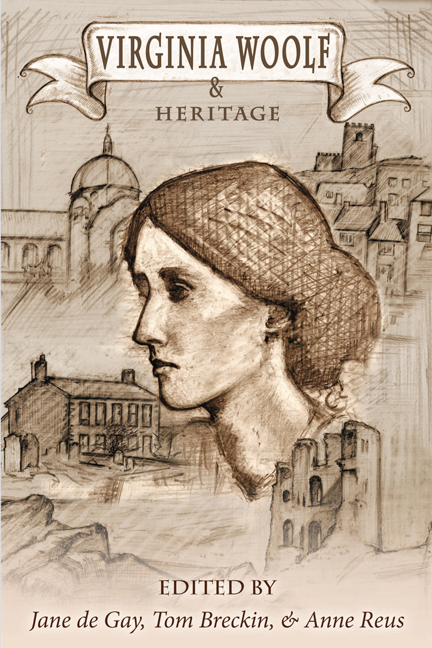Book contents
- Frontmatter
- Contents
- Introduction
- List of Abbreviations
- HERITAGE: A DEBATE
- HERITAGE, EDUCATION, AND MENTORING
- “The Very Centre of the Very Centre”: H. A. L. Fisher, Oxford, and “That Great Patriarchal Machine”
- Virginia Stephen's Uneasy Heritage: Lessons, Readers, and Class
- Teaching Virginia Woolf in Sin City: Vegas Entertainers and a New Feminist Heritage
- Out-takes from Upstarts: Virginia Woolf, Jane Ellen Harrison, and the Heritage of Dissent, or, “There She Wasn't?”
- Virginia Woolf 's Female Heritage: The Legacy of Anny Thackeray Ritchie, Woolf 's “Transparent Medium”
- HERITAGE SPACES
- LITERARY AND CULTURAL HERITAGES
- QUEER PASTS
- MODERNISM AND HERITAGE
- WRITING LIVES AND HISTORIES
- WOOLF'S LEGACIES
- FINALE
- Notes on Contributors
Out-takes from Upstarts: Virginia Woolf, Jane Ellen Harrison, and the Heritage of Dissent, or, “There She Wasn't?”
from HERITAGE, EDUCATION, AND MENTORING
- Frontmatter
- Contents
- Introduction
- List of Abbreviations
- HERITAGE: A DEBATE
- HERITAGE, EDUCATION, AND MENTORING
- “The Very Centre of the Very Centre”: H. A. L. Fisher, Oxford, and “That Great Patriarchal Machine”
- Virginia Stephen's Uneasy Heritage: Lessons, Readers, and Class
- Teaching Virginia Woolf in Sin City: Vegas Entertainers and a New Feminist Heritage
- Out-takes from Upstarts: Virginia Woolf, Jane Ellen Harrison, and the Heritage of Dissent, or, “There She Wasn't?”
- Virginia Woolf 's Female Heritage: The Legacy of Anny Thackeray Ritchie, Woolf 's “Transparent Medium”
- HERITAGE SPACES
- LITERARY AND CULTURAL HERITAGES
- QUEER PASTS
- MODERNISM AND HERITAGE
- WRITING LIVES AND HISTORIES
- WOOLF'S LEGACIES
- FINALE
- Notes on Contributors
Summary
With the death of my mother last April (2015) and on its heels the death of my intellectual mother, Virginia Woolf scholar and feminist upstart, Jane Marcus, last May (2015), I found myself over the course of last year in the curious position of being between the two rocks of their respective archives and a hard place.
My mother, also an upstart, and volatile personality, never made it to college. We were working class and always strapped for cash. She, a voracious reader, was self-taught, but instilled in us, in between factory jobs, a love of language, literature, and ideas. When I left for college, she had a nervous breakdown. She began casting about for intellectual outlets to suit the extravagances of her mind, which, without going into too many personal details, were many, at the time. She tried joining a local Native American Indian tribe, as she claimed we were part Cherokee (there actually may be some truth to this, or, as Virginia Woolf might write, dot, dot, dot, […] her famous ellipses indicating silence, or a persistent, yet, paradoxically, generative gap in one's knowledge…and so, there may be some truth to this…or not). In any case, she was given the name, Squash Blossom, but was soon banned from tribal gatherings for her outspokenness.
When her letters to me at college no longer ended with “Love, Squash Blossom,” but, instead, “Live Long and Prosper, Mom,” I knew she was in the midst of a seachange. Apparently, after a few false starts, she found an intellectual home of sorts in an obscure sub-culture known as K/S, or Kirk/Spockers. Some in the audience familiar with the genres of science fiction and fantasy will recognize the phrase, “Gay Star Trek,” while others will perhaps wonder, dot, dot, dot […] where is she going with all of this? In plainer terms, my mother began writing, editing, and critiquing stories written by fans of the popular television show, Star Trek, which take the characters of the show, created by the visionary Gene Roddenberry, on a variety of queer journeys, to say the least.
- Type
- Chapter
- Information
- Virginia Woolf and Heritage , pp. 42 - 46Publisher: Liverpool University PressPrint publication year: 2017

